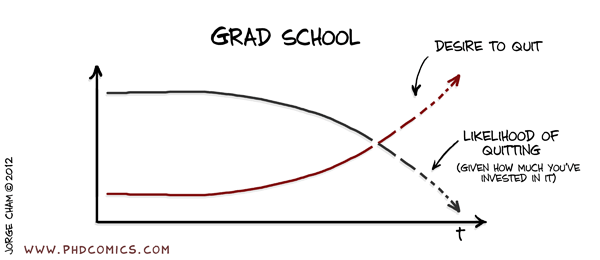Best practices:
- experiment with citation, note-taking, and to-do list tools
- Not everyone works in the same way, so the "standard" or most popular tool may not mesh perfectly with your style. Compromise being mainstream and explore all of the options. Read blogs, gather information, and experiment before completely adopting a tool. Once you find it, stick with it, make sure it is updated and you can have access to it when needed.
- find your "zone" location where you can really get down to work
- I found that I was more productive in the office at my cubicle than anywhere else. When I really had deadlines to meet, I would only go there and stay there. I would bring snacks and drinks with me and stay there as long as I needed to be there. When my work was not as pressing or I was getting ahead, I let myself work from home, and be distracted every so often. These clear distinctions between work and home helped me stay on track.
- plan ahead (at least 6 months)
- This may seem a bit like an Emma-ism, because I am a planner, obsessed with making lists, placing things on my calendar, and working ahead. But, I think that this statement still has merit for all graduate students, simply because the 5 years (as I know from this first year) will go by quickly. Begin to plan out where you want to be, what you want your C.V. to look like, and how you can get there. Considering that conference deadlines are usually 6 months out, the publication process takes years in some cases (my senior thesis was published this April after 1 year), and students go on the job market as early as their fourth year, you cannot plan ahead enough. I recommend placing important events (such as conference deadlines and dates) on your calendar tool as soon as you know them to keep them in mind.
- prioritize (be specific)
- Continuing from the planning ahead idea, in order to do so, you must be able to keep organized and prioritize successfully. I keep a "pipeline" on my whiteboard at my desk which shows the stages that my current projects are in. This is a good template for making sure that there is progress and projects in the works. My pipeline has 6 categories (some more quantitative people have more for data collection): Ideas, Background research, Writing, Finalizing, Under Review, In Press. I also have a separate off-shoot under finalizing where I have "conference ready" papers. This is a poor "to-do" list, however, because it only lists large projects. Instead, I recommend making lists of specific, detailed next steps for the projects, prioritized by deadlines. I enjoy variety, so I like to mix up the order of the steps between projects to say engaged. For example, instead of "perform content analysis for Mormon project", I would write, "write code sheet", "find coders", and "perform LexisNexis search". Not only does this break the project up into more manageable sized chunks, but it also feels great to check off many things from your list!
- find your balance
- One of the most difficult parts of graduate school so far has been balancing how much I would like to do and how much I am physically capable of doing. I have dozens of projects in the "ideas" column that will probably never get to the "background research" stage, but that is okay. No one can fulfill every project idea (that's what tenure is for, I've heard) and it will probably only lead to sub-par papers anyway. Instead, keep track of ideas, reach out to colleagues and partners, and balance your time between the most fruitful project ideas and classwork, teaching, research assistant work.
- be social, find your hangout spot
- Your peers in your year (cohort as USC calls them) are your best allies. They are in the same boat, taking many of the same classes, dealing with the same requirements and school/program nuances, so they can relate to you better than anyone else. Be open to socializing outside of the office, make time to relax, get to know your colleagues, and have fun! Not only will you be calmer, more relaxed, and have a better quality of life, but you may also be lucky enough to realize that your particular cohort rocks out loud:
 |
| Case in Point: USC Anneberg '16 |





